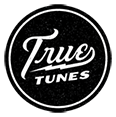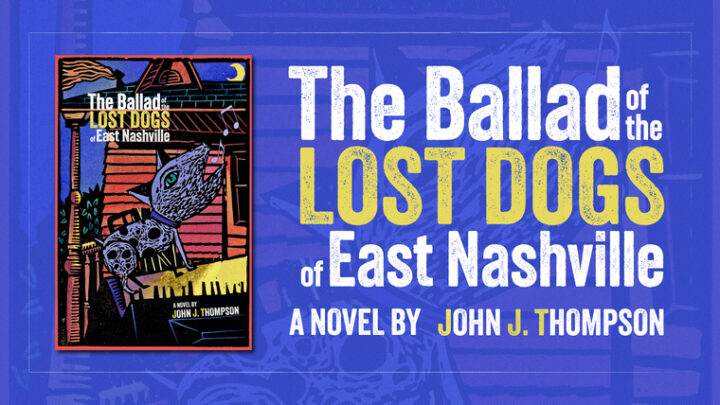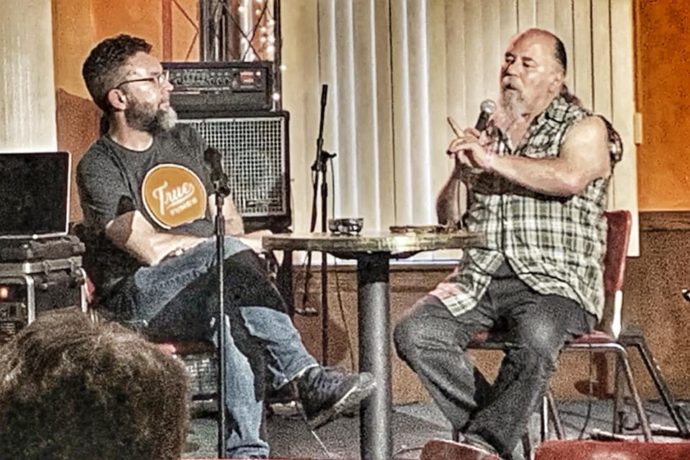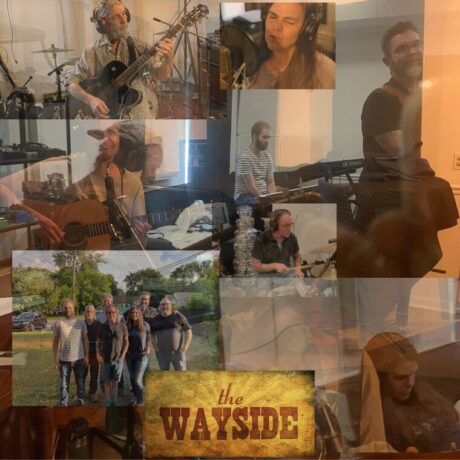Dig Here, Said the Angel – A Study of Daniel Amos’ Stunning New Record
(Click on this Spotify playlist (also linked from the front page) to stream this record while you read)
I feel this “review” needs to be a bit different from my usual fare. I’m going to assume that the hardcore Daniel Amos fans already have this set – and that in fact most of them helped it come to be through their support of DA’s Kickstarter campaign. Since I can’t imagine an active fan of the band to be anything less than breathless about this record I am going to target these next few paragraphs toward the following two groups of people:
- People who used to love and follow Daniel Amos but have lost touch for one reason or another
- People who, tragically, have yet to hear them
I suppose there is a third group in the back of my mind; those handful of people who have heard the band but somehow didn’t “get” them. Maybe it’s their time.
I shall also henceforth drop the pretense that this offering of mine is a “review” in the classic sense of the word. Think of it as an introduction, a contextualization, even a meditation – and think of me as your tour guide. I’ve been following Daniel Amos since I was about 13. Along with a very small cadre of other obscure artists, and one internationally famous one, they shaped my imagination, inspired my pen, and made me dream of someday writing a song that would have the same electrifying and soul-stirring effect on some other kid that they had on me. So sure, this may be a valentine, but it is an incredibly well-informed valentine written by someone who would certainly have earned a PhD in “alternative, faith-fueled, culturally relevant, God-haunted, rock, pop, folk, and country music” if such a degree existed. Yes, kids, I’m an expert on this band and the scene they have helped to inspire. You can trust me. I’m a professional.
But here’s the thing, being the super-fan that I am only means that I am predisposed to love their newest record, not that I actually will. It’s dangerous business having heroes in this world. It’s been a long time since the band had even seen each other, let alone played a gig. There had been health issues, financial challenges, geographical changes and every other kind of challenge facing the band. Was this going to really live up to the high standard they had set for themselves? I’ll be honest right here; I was just hoping that it would be “pretty good.” A “pretty good” DA record would still be better than most other records released in any decade. But the first time I heard Dig Here, Said the Angel – and I promise you I am not exaggerating here – I cried.
I’m not a big crier.
This record isn’t just among Daniel Amos’ best, it’s not just one of the best independent records of the year, it’s not even just the best faith-based rock project of the last decade or so. No, this is the kind of record lives are changed by. This is the kind of record that some 20 year old out there needs to hear right now. This is the kind of record that modern fans of Blitzen Trapper, Amos Lee, The Beatles, Alt-J, Elvis Costello, The Replacements, My Morning Jacket and Band of Horses – or even Casting Crowns – need to hear. This was exactly the record I needed to hear this summer. If this world wasn’t so jacked up this would be already be certified Gold.
It’s been a dozen years since Daniel Amos released an album. A dozen years! While Terry Scott Taylor has certainly stayed busy with solo projects, some of the best Lost Dogs records in years, and some way-under-the-radar production music, the band that first introduced his unique in every way voice to the world back in 1974 has been silent for way too long. Some things get rusty when not used. Muscles stiffen with age. Colors fade. Not so with Daniel Amos. Dig Here, Said the Angel, may be their best album yet – only time will tell. With a million records at my Spotify fingertips I can listen to anything and yet I frequently find myself choosing to stream several entries in the DA catalog. Without exaggeration I have probably heard Horrendous Disc (1980,) the entire 4-album Alarma! Chronicles set (1980-1986,) Darn Floor Big Bite (1987,) Motorcycle (1993) and Mr. Beuchner’s Dream (2001) more than a thousand times collectively. I’m still not tired of them. It’s amazing to hear that every member of the band; Ed McTaggart (drums,) Tim Chandler (bass,) Greg Flesch (guitar,) Rob Watson (keys,) and Jerry Chamberlain (guitar,) have never sounded better. I got to spend a bit of time with them in the studio and was struck by how tight, confident and just plain cool they sounded.
Dig Here accomplishes something veteran bands strive for but rarely achieve. It references, literally, everything fans ever loved about the band’s music and yet clearly stakes out new territory in a remarkably contemporary and relevant way. Daniel Amos has been known for a few staples:
– Sarcasm / wit / satire
– Confronting difficult issues (death, fear, superstition, science, existential angst)
– Diving into the deep end of the theological pool
– Caterwauling
– Honoring their musical influences (Beach Boys, Beatles, Dylan, Costello, The Tubes, etc)
That’s all here, but with a dose of grace, encouragement and generally positive energy that, while not absent from their previous repertoire, was certainly not a consistent trait. Christian music, you must remember, was full of shiny, happy, ridiculous music. Daniel Amos’ job was to be the rock in the church’s shoe; the fly in the CCM ointment. They dared to quote texts other than the Bible or C.S. Lewis. They clearly studied the greats of Classic Rock and yet never felt the need or desire to be the “Christian” version of any other band. The more they shocked and offended the cloistered Christian music cognoscenti the more obscure they became. Sometimes it seemed they were intentionally trying to make it as difficult for anyone to accept them as they possibly could. Like the rebel at the school playground that wanted to be in charge of his own rejection, Daniel Amos did everything wrong to make it in either Christian or “mainstream” music. And though the breaks between records have been long, they have never stopped doing their thing.
Clearly, this time around the band seems less interested in making big statements, asserting their reason for being, or raging against anything in particular. Instead, this record feels like a heartfelt offering for their longsuffering fans; folks who have been going through the pain of aging, the loss of loved ones, struggles with loneliness, addiction, divorce, failure, poverty or self-reliance. Terry spends a lot of time on the road, playing house concerts and sitting in diners listening to people. He has recently come through the same kind of financial and health challenges that plague us all. Instead of enduring his trials alone, however, his fans stepped up to help. When a long-time friend of Terry’s circulated news that he was in need his tribe rushed to throw a few bucks in the hat. For those of us in that tribe it felt a lot like the end of It’s A Wonderful Life seeing a man’s needs get met so completely, and tangibly, by fans that felt more like friends. It is my strong hunch that Dig Here, Said the Angel, is Terry’s – and the band’s – heartfelt “thanks.”
Musically the collection, recorded in Nashville by Choir member and fellow Lost Dog Derri Daugherty, is rich, eclectic and satisfying. It is completely consistent with the band’s landmark records – referencing everything from the angular post-punk of Alarma! to the psychedelic ambience of Motorcycle. Each member’s identity is felt in their tracks and the whole thing is recorded with remarkable fidelity. To my ears it is the best sounding Daniel Amos record yet. It certainly begs to – and is worthy to – be played on a good stereo or enjoyed with high-end headphones. The layers are perfectly arranged and expertly mixed. Even Terry’s vocal – which can be abrasive if not handled appropriately – is warm and invited. I’ve compared this set to his vocals going back to the first records and I honestly think he sounds better than he has ever sounded.
All of that great tone and all of those expert musical performances, however, are in the service of some of the most thoughtful and heart-warming lyrics I’ve heard in the rock genre. Though the themes are subtle, the message is clear. Dig Here is about suffering, struggle, pain, dying and rising again. It’s a feel-good record about death, for crying out loud!
The opening track “Forward In Reverse” gets things going with a decidedly Sgt Pepper-esque echo as the lyric describes a vision of the kind of inversion promised by Jesus of the coming Kingdom of heaven. Death is reversed, sins are wiped away, the last get in first and everything culminates in a return to the kind of “holy, holy love” that existed between God and man, and man and woman, before the fall. It’s a lightly psychedelic meditation on the Justice of God and the ultimate redemption believers hopefully still look for. It’s a surprisingly positive and charming opening salvo that leads right into a long set of songs that bring the listener right back into the brokenness of the here and now.
The second song, “Jesus Wept” is where I lost it. Sure, I was dealing with some personal family pain and fear, but who isn’t. With a classic pop riff that would have made every member of the Travelling Wilburys giddy, Terry reminds us that “before the latter reign, before the healing came, Jesus wept.” The implication is powerful. The singer exposes his own vulnerability and immediately connects to a part of the listener that even most DA fans probably did not see coming.
I found my masterpiece in a discount bin
I pound against the wall of my aging skin
Crying “Let me out”
“Let me out”
Who’ll untie the ropes that restrain my wings
And help me understand when death still stings
I’m crying “Let me out”
You’re saying “No, not yet”
Before he danced Jesus wept
(Jesus Wept)
Seriously, by the first chorus I was choked up. By the bridge the tears were streaming and I decided to stop fighting them. Jesus wept, after all. He knows all about pain. I know that, but hearing it sung to me in this way was powerful.
The theme continues.
On the title track, in another dream-sequence, an angel takes the singer on a tour of his own pain. Though sometimes the suffering is just too much and we just want to be taken away – to shed our mortal coil and see Jesus face to face – the angel reminds us that it’s not our time yet. In “Our New Testament Best” I expected some satire, but instead Taylor looks at the effect grace can have on a relationship. It’s one of the most unique, and in its own way sweetest, love songs I’ve heard. “Love, Grace, and Mercy” is the confession of a man who is done trying to manage his own sin and is finally experiencing the intoxicating bliss of God’s relentless pursuit of his heart. This kind of realization is so different than religion.
You’ve got your methods
I’m done with trying to guess all your moves
I’m going where you want me to go
I’ve got nothing left to lose
Now I don’t wanna suffer
But that’s in fact the nature of the beast
If you want to get to higher ground
You got to get there on your knees
(Love, Grace and Mercy)
There’s that pain and suffering thing again. And the track is anything but morose. When the church bells chime at the end the song becomes a worship moment. Like the “Banquet at the World’s End” from 1993’s Motorcycle, but it’s happening here and now. Powerful stuff.
A bit of the old DA snarl returns, with an appropriately self-deprecating post-punk wink on “Now That I’ve Died.” Again with the visions, the singer is sending a letter to a loved one from the other side of the veil. Then the home-stretch begins. “We’ll All Know Soon Enough” sounds like a gothic western in which a wayward pilgrim, who was likely never set on the right path in the first place, decides that maybe the trials of life mean that there is no God up there. “Waking Up Under Water” recalls the frantic pace of something from 1982’s Doppelganger as it offers a more oblique or obscure dream about baptism, death, or something like that. In the best DA tradition, you get the point without necessarily understanding the specifics.
“The Use of Adversity” then gets very specific.
My heartbeat is the pounding of your iron hand breaking me
Who knows where this shattering love is taking me
‘Cause you’re much too small if you’re not a Mystery
So don’t send me rain if I bloom in drought
No don’t send me certainty if somehow it’s best for me to doubt
(The Use of Adversity)
But despite all the confidence and assurances, the fear, anxiety, depression or other self-destructive emotions often return. “The Ruthless Hum of Dread” admits to lingering confusion despite faith. It’s a long song, clocking in at over 6 minutes, and it ranges from full production to near a capella vulnerability. I’d have to quote the whole song, and I won’t do that, but it reads like a cross between Poe, Blake and Lewis’ The Problem of Pain. Just stunning. It’s a movie with no pictures.
And then there’s the closer, “The Sun Shines on Everyone,” an unabashed hands-in-the-air anthem. Lyrically Taylor returns to book of Matthew – and in fact to the same chapter (5) that includes the incredibly subversive “beatitudes” that I can’t help but notice are lingering in the background of the album’s first song. Blessed are the poor in spirit. Blessed are those who mourn. Blessed are the gentle. Blessed are those who hunger and thirst for righteousness. Blessed are the merciful, the pure in heart, the peacemakers and the persecuted. Later in that same sermon Jesus tells us this additional bit of counter-intuitive wisdom:
44But I say to you, love your enemies and pray for those who persecute you, 45so that you may be sons of your Father who is in heaven; for He causes His sun to rise on the evil and the good, and sends rain on the righteous and the unrighteous. (Matthew 5:44-45 NASB)
Daniel Amos just took us on a tour of the beautiful, confusing, lavish world of God’s grace – the kind of grace that we really only experience in our brokenness. God knows when we are hurting, and he hurts with us. He knows when we are afraid, and he comforts us. He tries his best to remind us that this world in its broken form is not our home and that death is not the end. We’re just so busy we fail to hear him. I’ve long known that Terry Scott Taylor has a gift, but it seems that something very true and special happened when he allowed himself to suffer and to be weak within the context of an extended community. This is important stuff worthy of a massive audience. The fact that this band would put this much effort into a project like this, knowing that it would likely be heard by just a handful of die-hard fans, is amazing to me.
At one point during one of my visits to the studio Tim Chandler and I were sitting on the couch in the control room while Terry was cutting vocals and actually tweaking lyrics as he went. He carried a stack of legal pads and a pen with him the entire time I was there. It was clear to me that it was very important to him that every line was perfect. After the end of a take Tim leaned over to me and quietly said “This is the best stuff he has ever written.” I think Tim was right.
(Coming Soon: My sit-down interview with Terry Taylor. Subscribe to this blog to see it first.)
Please listen for yourself, and then head over to www.DanielAmos.com and order this record AND the new 2-disc remastered version of their incredible 1980 album Alarma! This kind of work deserves our support.





September 17, 2013 @ 11:45 PM
99.9% masterpiece, John. The one word I quibble with is “cognoscenti.” That usually refers to people with “superior knowledge, highly refined taste.” Clearly, if the CCM “gatekeepers” or “powers that be” were offended or shocked by DA, that could then NOT be possessors of “superior knowledge.”
September 18, 2013 @ 9:00 AM
Ah – good point. I used the word to describe people that THOUGHT of themselves as being of superior knowledge or refined taste. You know, the folks that gave us so many excellent, thoughtful, artful CCM records in the 80s.. THOSE people 😉 Next time I’ll refer to them as Pseudo-Cognoscenti.
September 18, 2013 @ 10:46 AM
Best review I’ve read. I found myself nodding in agreement about a thousand times. Especially about crying during Jesus Wept. Thanks for mentioning the hardships Terry has been having and how that likely influenced the record. I hinted at that in my review but wasn’t real specific.